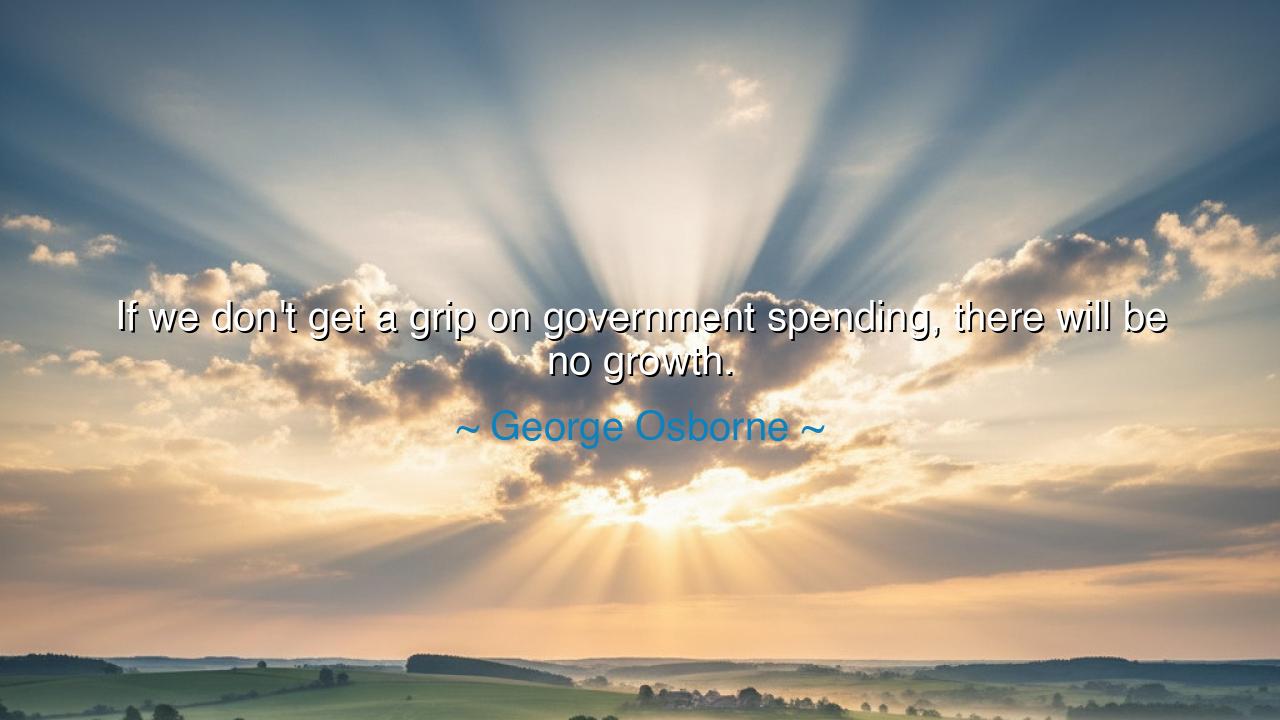
If we don't get a grip on government spending, there will be no






When George Osborne declared, “If we don't get a grip on government spending, there will be no growth,” he spoke as one who had looked upon the ledgers of a nation and seen not just numbers, but the tremors of destiny written within them. His words echo an ancient principle, older than kings and empires: that prosperity cannot be born from excess, and that nations, like men, must govern their appetites or be consumed by them. In this simple yet urgent warning, Osborne captured the eternal struggle between discipline and indulgence, between the desire to give freely and the duty to spend wisely.
The origin of this quote lies in the aftermath of the global financial crisis of 2008, when economies across the world trembled beneath mountains of debt. Osborne, serving as the Chancellor of the Exchequer in the United Kingdom, faced a Britain burdened by rising deficits, stagnation, and the fear that unchecked government spending would choke the life from private enterprise. His message was not only a policy stance but a moral call to restraint — to recognize that true growth does not spring from endless borrowing, but from fiscal discipline, innovation, and the courage to live within one’s means.
At its heart, the quote speaks to a universal truth: that growth, whether in a nation, a business, or a soul, demands order. Just as a tree cannot flourish if its roots drown in excess water, an economy cannot prosper when its foundations are flooded by debt. Government spending, when unleashed without measure, creates an illusion of prosperity — streets may gleam for a moment, promises may abound, but beneath the surface, decay sets in. It is the false dawn before the storm, when the people awaken to find that what was borrowed in comfort must be repaid in pain. Osborne’s wisdom lies in his reminder that discipline is not the enemy of growth; it is its seed.
History bears witness to the peril of ignoring this truth. In ancient Rome, emperors lavished their citizens with games, grain, and gold to secure their loyalty. For a time, the empire glittered with wealth and spectacle. Yet as the treasury emptied and debts mounted, taxes rose, trade declined, and the moral fiber of the Republic crumbled. The Rome that once built aqueducts and legions began to rot under the weight of its own indulgence. What began as generosity ended in ruin. The same fate has visited kingdoms and republics alike — when spending becomes a tool of politics rather than a servant of prudence, decay is inevitable.
But Osborne’s insight was not born of cynicism — it was born of hope. He believed that by restraining excess, a nation could reclaim the strength to invest in the future. His call to “get a grip” was not a demand for austerity for its own sake, but a plea for clarity and courage: to recognize that every resource misspent is a future sacrifice, every unchecked debt a chain upon the next generation. To govern well is to prepare the soil for tomorrow — not merely to harvest today’s crop. A wise leader must learn when to spend, and when to save; when to nurture growth through support, and when to free it by removing the weight of dependency.
In the style of the ancients, we may say that Osborne was warning against the seduction of comfort — that sweet voice that tells a people they can have all things without cost, that promises plenty without labor. Yet such comfort is the herald of decline. Growth is born not of comfort, but of effort, restraint, and balance. The farmer who eats all his seed will reap no harvest. The state that spends without thought of return will one day find itself bankrupt — not only in wealth, but in will.
The lesson of George Osborne’s words, therefore, extends far beyond economics. It is a lesson for every citizen, every family, every soul: that growth requires self-control. Whether managing the treasury of a nation or the budget of a household, one must learn the discipline of stewardship — to spend with purpose, to save with foresight, and to invest with wisdom. It is the art of saying no today so that one may say yes to the greater tomorrow.
So remember this truth, handed down like a torch through time: wealth without restraint is ruin disguised as success. Let governments learn it, let citizens live it, and let every generation guard it. For when discipline guides prosperity, growth becomes not a fleeting burst, but a lasting flame — steady, radiant, and strong enough to light the future.






AAdministratorAdministrator
Welcome, honored guests. Please leave a comment, we will respond soon